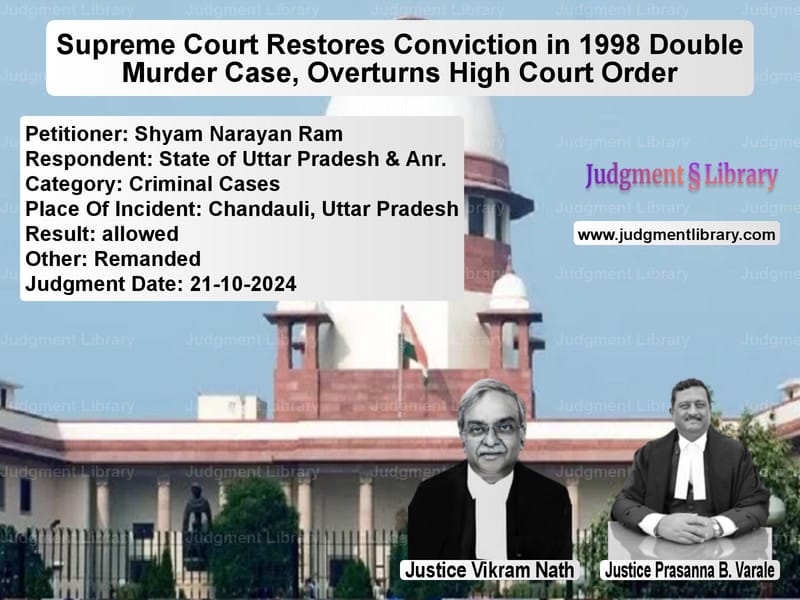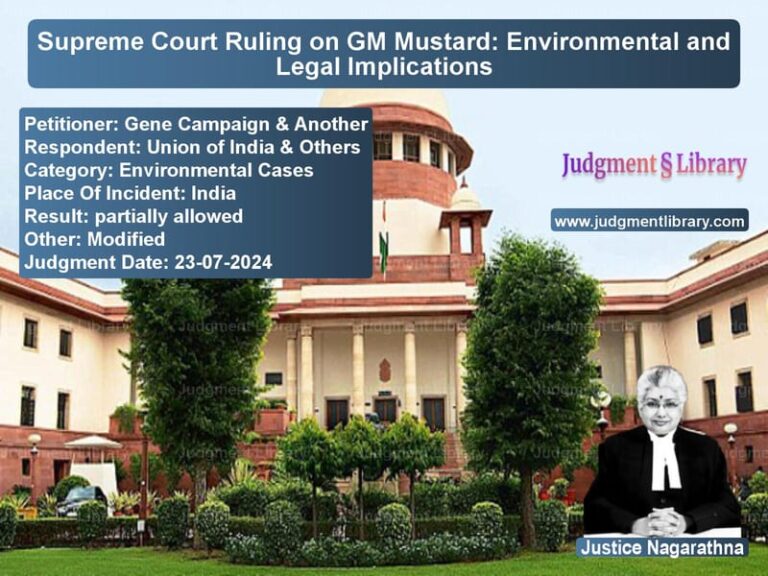Supreme Court Restores Conviction in 1998 Double Murder Case, Overturns High Court Order
The case of Shyam Narayan Ram vs. State of Uttar Pradesh & Anr. is a landmark ruling by the Supreme Court regarding procedural lapses in a criminal trial. The judgment, delivered on October 21, 2024, overturned an Allahabad High Court order that had remanded the case for retrial, restoring the conviction and directing the accused to surrender.
Background of the Case
The case pertains to a double murder that occurred on the intervening night of April 21-22, 1998, in Dhanapur, Chandauli district, Uttar Pradesh. The informant, Shyam Narayan Ram, alleged that the accused, identified as Radhey Shyam Lal (A-1), Pratap (A-2), Rajesh Kumar @ Pappu (A-3), and Jagannath (A-4), brutally assaulted his parents—Bodha Devi and Mohan Ram—before throwing their bodies into a well.
A First Information Report (FIR) was lodged on April 22, 1998, at 5:30 AM under Sections 302/34 of the Indian Penal Code (IPC) and Section 3(1)(v) of the Scheduled Castes and Scheduled Tribes (Prevention of Atrocities) Act, 1989.
The case proceeded to trial, where the prosecution relied on eyewitness testimony, forensic reports, and ballistic evidence. The trial court convicted all four accused in 2019, sentencing them to life imprisonment. However, the Allahabad High Court, in its order dated November 1, 2023, set aside the conviction and remanded the case for a fresh trial, citing procedural irregularities, particularly the lack of formal proof for certain prosecution documents.
Petitioners’ Arguments
- The appellant argued that the High Court’s decision to remand the case for retrial was erroneous as it overlooked key legal provisions.
- They contended that Section 294 of the Code of Criminal Procedure (CrPC) allows courts to admit documents without formal proof if their genuineness is not disputed.
- The defense had repeatedly admitted the genuineness of prosecution documents, making their formal proof unnecessary.
- The conviction was based on credible eyewitness accounts, forensic reports, and ballistic evidence, which the High Court failed to appreciate.
Respondents’ Arguments
- The accused supported the High Court’s order, arguing that their right to a fair trial was compromised due to procedural lapses.
- They contended that the prosecution failed to produce formal witnesses to authenticate key documents.
- The defense was denied the opportunity to cross-examine key witnesses.
Supreme Court’s Observations
- The Court held that the High Court misinterpreted Section 294 CrPC, which allows documents to be admitted into evidence without formal proof if their authenticity is not challenged.
- It noted that the defense had repeatedly admitted the prosecution documents, making their formal proof unnecessary.
- The Court found no substantive reason to remand the case for retrial, as the evidence on record was sufficient for conviction.
- The ruling emphasized that procedural lapses should not be allowed to undermine substantial justice.
Supreme Court’s Ruling
- The High Court’s order remanding the case for retrial was set aside.
- The conviction and life sentences imposed by the trial court were restored.
- The accused were directed to surrender within six weeks before the trial court.
- The Court clarified that the accused could apply for suspension of sentence before the High Court.
Legal Implications of the Judgment
This ruling has significant consequences for criminal law:
- Upholding Section 294 CrPC: The judgment clarifies that once documents are admitted by the defense, their formal proof is not required.
- Preventing Unnecessary Retrials: It reinforces that remanding cases for retrial should be an exception, not a routine practice.
- Ensuring Judicial Efficiency: The ruling emphasizes that procedural errors should not lead to undue delays in justice.
Conclusion
The Supreme Court’s decision in this case reinforces the principle that procedural technicalities should not be used to subvert justice. By restoring the conviction, the Court has upheld the importance of credible evidence and judicial efficiency, ensuring that the victims receive justice without unnecessary delays.
Petitioner Name: Shyam Narayan Ram.Respondent Name: State of Uttar Pradesh & Anr..Judgment By: Justice Vikram Nath, Justice Prasanna B. Varale.Place Of Incident: Chandauli, Uttar Pradesh.Judgment Date: 21-10-2024.
Don’t miss out on the full details! Download the complete judgment in PDF format below and gain valuable insights instantly!
Download Judgment: shyam-narayan-ram-vs-state-of-uttar-prade-supreme-court-of-india-judgment-dated-21-10-2024.pdf
Directly Download Judgment: Directly download this Judgment
See all petitions in Murder Cases
See all petitions in Judicial Review
See all petitions in Bail and Anticipatory Bail
See all petitions in SC/ST Act Case
See all petitions in Judgment by Vikram Nath
See all petitions in Judgment by Prasanna Bhalachandra Varale
See all petitions in allowed
See all petitions in Remanded
See all petitions in supreme court of India judgments October 2024
See all petitions in 2024 judgments
See all posts in Criminal Cases Category
See all allowed petitions in Criminal Cases Category
See all Dismissed petitions in Criminal Cases Category
See all partially allowed petitions in Criminal Cases Category







